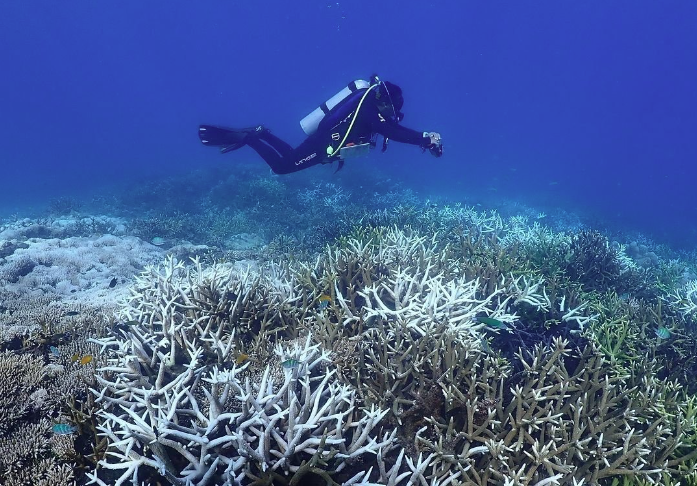Can Malaysia overcome the barriers to save its coral reefs?
Overcoming these barriers necessitates collaboration between governments, researchers, NGOs, private sector entities and local communities.
SHARIFAH SHAHIRAH
SHAH ALAM - Coral reefs are under persistent threats from climate change, including warming oceans and acidification, necessitating global action that goes beyond local conservation efforts. However, scaling innovative solutions faces significant barriers.
Reef Check Malaysia marine biologist and programme coordinator Alvin Chelliah said overcoming these barriers necessitates collaboration between governments, researchers, NGOs, private sector entities and local communities.
“Strategic partnerships and adaptive management approaches are crucial for facilitating scaling efforts.
“Leveraging existing networks ensures that conservation innovations contribute effectively to the long-term resilience and protection of coral reef ecosystems,” he said when contacted recently.
Chelliah stressed that one of the major barriers was financial constraints, as many innovative technologies and conservation strategies require significant funding for development, deployment and maintenance.
He added that securing long-term financial support could be challenging, especially for projects in developing countries or regions with limited resources.
Additionally, Chelliah said some innovative technologies, such as remote sensing tools or underwater robotics, might require specialised expertise, infrastructure and ongoing technical support.
He stressed that ensuring these technologies were accessible and adaptable to diverse reef environments can be a hurdle.
Other barriers highlighted by Chelliah include:
Regulatory and policy frameworks
He said that implementing new technologies or conservation approaches often requires navigating complex regulatory landscapes and securing necessary permits.
He added inconsistent or unclear policies across jurisdictions could delay or hinder scaling efforts.
Capacity building and training
Chelliah stressed that effective use of innovative tools and approaches often relies on trained personnel with technical skills in data analysis, remote sensing, robotics and marine biology.
Building local capacity through training and education is crucial, he said but it could be resource-intensive.
Integration with local knowledge and communities
Successful scaling of conservation initiatives requires meaningful engagement with local communities, indigenous knowledge holders, and stakeholders. He said that ensuring that innovations are culturally appropriate, socially acceptable and aligned with local conservation priorities is essential for sustainability.
Monitoring and evaluation
Chelliah highlighted that scaling up requires robust monitoring and evaluation frameworks to assess the effectiveness of innovative approaches over time.
He added developing standardised metrics, collecting reliable data and interpreting results accurately are critical for adaptive management and scaling success.
Socioeconomic and political factors
He also emphasised that coral reef conservation often intersects with broader socio-economic issues, such as livelihoods dependent on reef resources, tourism revenues, and competing land-use interests.
Chelliah stressed that balancing conservation goals with economic development and political priorities can be challenging.
Climate change and global stressors
He said that coral reefs faced ongoing threats from climate change impacts, such as warming oceans and ocean acidification, that require global action beyond local or regional conservation efforts.
Chelliah added that scaling up innovative approaches must consider these broader environmental challenges.
Public awareness and support
Chelliah also said generating public awareness, support and advocacy for coral reef conservation was crucial for scaling efforts.
He said that communicating the value of reefs, the urgency of threats and the benefits of innovative conservation approaches can mobilise resources and political will.
Apart from the primary barriers and challenges, Chelliah also highlighted factors that could lead to the failure of conservation efforts, particularly stemming from a lack of awareness and engagement.
He warned that if local communities were not adequately informed about the importance of coral reefs or involved in decision-making processes, they might not support or comply with conservation policies.
“Conflicts can arise between conservation goals and local economic interests, such as fishing and tourism development," he said.
Chelliah added other reasons that could lead to failure were alternative livelihood options that were not viable or if regulations were perceived as unjust or restrictive. This was on top of limited financial resources, technical expertise and institutional capacity within local communities, which can hinder their ability to effectively implement and enforce conservation measures.
Additionally, Chelliah said global market demands, climate change impacts, and international policies can override local conservation efforts, making it challenging for communities to protect reefs on their own.
He added that failure could also occur when immediate economic needs outweigh long-term environmental considerations, causing local communities to prioritise short-term gains over sustainable resource management.
Chelliah said that the success of coral reef protection policies heavily depends on the active participation, knowledge, and commitment of local communities and stakeholders.
He stressed that by fostering collaboration, supporting local initiatives, addressing socio-economic challenges, and integrating traditional knowledge with modern conservation practices, policymakers can enhance the resilience of coral reefs and ensure sustainable outcomes for both ecosystems and communities.
Download Sinar Daily application.Click Here!














